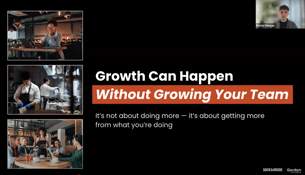When it comes to digital marketing, content is everything. Smart, appealing, strategic content helps restaurants attract customers, engage followers, and drive sales. But effective content marketing for restaurants can be challenging.
It takes a lot of work to come up with fresh restaurant content ideas, to post across social media accounts with regularity, and to establish a clear voice and brand identity through your content. Fortunately, there are a few easy steps you can take to improve your content marketing game.
But before we get to the tips, let’s learn a little bit more about content marketing for restaurants.
What is Content Marketing for Restaurants?
Today, content is an all-encompassing term. Your content includes the written copy and imagery displayed on your website, the messages conveyed through promotional materials and email marketing campaigns, and every single post, video, story, reel, or recipe that you share on social media.
In other words, content marketing refers to the full spectrum of materials that you develop and distribute online in order to amplify messaging, convey brand visibility, engage existing customers, and reach new customers. Effective content marketing for restaurants requires creativity, consistency, and a clear sense of how to use the various tools and social media channels at your disposal.
10 Ways to Master Content Marketing for Your Restaurant
Content is an essential component of any marketing strategy, but how does that specifically apply to the restaurant industry? Here are 10 ways you can master content marketing as a restaurant:
1. Know your audience
The first rule of content creation is to understand your target audience. Get a clear picture of the demographics that make up your customer base. Many social media channels include robust advertising tools that can help you segment your audience according to factors like age, geography, and even dining preferences.
This makes it possible to craft more personalized messaging. So before you start cranking out new content, make sure you know who you’re attempting to reach. Craft your voice and messaging accordingly.
2. Leverage social media
Which social media channels are right for your restaurant? Facebook? Instagram? Tik Tok? The answer is “all of them.”
Your restaurant content marketing strategy will depend in large part on how effectively you craft your content to each of these popular social media channels. Get to know each of these platforms, recognize popular posting trends, and take advantage of the individual strengths specific to each platform.
3. Start a blog
One of the most effective ways to keep fresh restaurant content ideas in circulation is to start your own blog. A blog gives you the opportunity to share your expertise and demonstrate brand authority.
Just as importantly, your blog is a critical SEO tool. Create blog content that improves search engine visibility for your restaurant. Your ranking on Google can play a major role in your ability to attract new customers. Use your blog to share news about your restaurant and spotlight new menu items alongside informative, keyword-rich articles about your unique corner of the industry.
And be sure to coordinate blog posting and social media efforts. When you create new content, make it visible through every channel at your fingertips.
4. Create a content calendar
Your content calendar is a roadmap for the content you plan to release. Build out new restaurant content ideas with about a 6 to 8 week lead time. This gives you the space to create content, conduct quality assurance, and post new material at an effective cadence. A thoughtful content calendar also gives you the chance to craft content in anticipation of holidays, monthly cultural celebrations, and seasonal shifts.
For help distributing this scheduled content across your social media channel, you may want to enlist the services of a social media scheduler such as Sprout Social or Hootsuite. Many of these vendors provide content calendar templates as well as access to personal consultation.
5. Remember the visual component
In digital marketing, your visual content is every bit as important as your messaging. The imagery, aesthetic, and subject matter you present on your website, blog, and social media channels send powerful signals to your audience about what to expect from your restaurant.
Make sure these signals are appetizing. It’s important to share compelling photo content with regularity. It’s even more important to ensure that these photos are professional, consistent with your brand identity, and that they cast your food and physical space in a flattering light.
6. Make video content
A growing number of diners prefer to connect with brands and businesses through video content. Channels like YouTube, Instagram, and TikTok are an increasingly critical part of content marketing for restaurants.
Not only that, but many of these platforms prioritize video content over static content. For instance, your Facebook and Instagram Reels are viewable even to users who don’t follow your account. Effective video content gives you a chance to branch out to new audiences while showing another side of your business to your current customers.
7. Go Behind the Scenes
If you’re looking for restaurant content ideas to drive your photo and video output, you may want to get a little more personal with your customers. Use your visual content to take followers inside your kitchen during dinner prep, or livestream footage of your head chef shopping for produce at the local farmer’s market.
Bring viewers along for the journey. Shedding a humanizing light on your business operation can help build a sense of community and personal connection with your customers.
8. Make your content easy to share
Be sure that you are making use of all relevant social media share widgets, and that your content is easy to repost anywhere that you have a presence. Most blog platforms and social media channels make it easy to share, repost, and tag other users.
But there are a few tricks of the trade when it comes to cross-posting from one social media platform to another. Make it easy for users to find the share buttons, and minimize the number of clicks it takes to share across platforms.
9. Keep it short and sweet
The average social media user will spend just a few precious seconds consuming a piece of content before moving on. Your content needs to grab your audience right away and deliver on its promise quickly.
Keep your headlines tight. Create small, digestible blocks of copy. Produce bite-sized videos. Share photos with quick, punchy captions. Get your message across quickly and concisely.
10. Include a call to action
Every piece of content that you create should include a call To action (CTA). What is the objective of the message? Is it to drive reservations? To share a downloadable coupon? To promote event attendance?
Consider this objective as you build your content and provide your readers with explicit instructions on how to take the desired action. This is also a great way to reverse engineer new restaurant content ideas, allowing your CTA objectives to inform the topics you choose to write about.
Bonus Tip: Track Your Content’s Performance
Content marketing for restaurants isn’t an exact science. But you can use science to do it more effectively. Use your digital marketing channels to test the effectiveness of your messaging, analyze customer behavior, and adopt your restaurant content ideas accordingly.
Draw insights from the performance of your social media posts, from your level of audience engagement, and from broader market trends. The best way to gather and leverage this data is with the support of an experienced third-party digital marketing group. And don't panic; if you need help sifting through all of the options available to you, you can book a free Discovery Call with a Back of House expert.
[Photo by Helena Lopes on Pexels]





